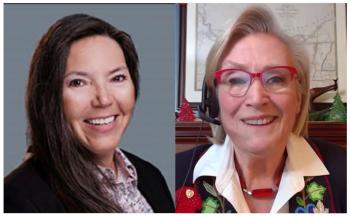Image Caption
Summary
Local Journalism Initiative Reporter
Windspeaker.com
Despite the slow progress, impacted by COVID-19 pandemic restrictions, the Assembly of First Nations Women’s Council is working with the federal government to develop a national action plan to implement the 231 Calls For Justice that came from the National Inquiry into Murdered and Missing Indigenous Women and Girls and 2SLGBTQQIA people.
It’s work that must continue, said Ocean Man First Nation Chief Connie Big Eagle. The chair of the Women’s Council reported this to chiefs and delegates on Dec. 8, the first day of the AFN’s annual general meeting.
“In this time of uncertainty facing our communities from COVID-19, First Nations people are dealing with the stress and anxiety about the future. First Nations women and girls and 2SLGBTQQIA are impacted especially hard because they are at a higher risk of experiencing violence,” said Big Eagle.
“What the pandemic has shown us is that there is not enough shelters and safe spaces to access. This highlights why we need a national action plan to increase the safety and security of First Nations women and girls and 2SLGBTQQIA people."
In his address to chiefs, Prime Minister Justin Trudeau acknowledged the importance of this work, noting that more money had been invested by his government for women’s shelters. The fall economic statement also included additional funding available to combat systemic discrimination and violence.
In May and then in October, the federal government announced $50 million each time in emergency funding for organizations providing supports and services to those experiencing gender-based violence.
“We will also accelerate work on the national action plan in response to the National Inquiry into Murdered and Missing Indigenous Women and Girls,” said Trudeau.
“Work is progressing well on the development of the national action plan,” said Crown-Indigenous Relations and Northern Affairs (CIRNA) Minister Carolyn Bennett.
That’s not a view supported by National Chief Perry Bellegarde.
In his opening remarks, Bellegarde expressed frustration with the lack of movement with a national action plan, one-and-a-half years after the national inquiry presented its final report. He said while he understood the restrictions COVID-19 placed on the government’s ability to consult and pass legislation, the framework was already there.
“We understand that the issues are complex and we know that a truly national action plan requires coordination across many jurisdictions …. (but) the families who poured their hearts into that inquiry deserve action,” he said.
“Like the national inquiry said about missing and murdered Indigenous women and girls, the status quo will not keep our people safe.”
Big Eagle is also not pleased with the progress.
She is part of a 13-member core working group that is co-chaired by two deputy ministers, Gina Wilson, from Diversity and Inclusion, and Valerie Royale, from Tourism and Culture.
Big Eagle said that at the end of August, the AFN Women’s Council asked to participate in a distinctions-based working group, coordinated by Bennett’s department.
“While this process with CIRNA has been ongoing over the fall months, it has not provided a clear vision or framework to develop a national action plan,” she said.
Big Eagle said COVID measures mean regional sessions can only happen virtually, so the Women’s Council has redesigned its approach and its priorities to focus on “immediate actions needed on the ground” including prevention and education.
“In the future when we can meet safely in person, we want to hold larger, in-person forums to discuss longer term systematic reforms that are needed to breathe life into the Calls For Justice,” said Big Eagle.
For now, the AFN Women’s Council is working with the AFN regional chiefs’ offices to coordinate virtual sessions with stakeholders, including mental health support workers and cultural support workers.
Sessions are tailored to meet the needs of the region, said Big Eagle, and are using a trauma-informed approach.
“We don’t want to repeat the national inquiry. We want to focus on the next step of prioritizing the 231 Calls For Justice,” she said.
Meetings have been held in Alberta and Saskatchewan, with preliminary planning taking place for meetings in Ontario and the north. British Columbia-AFN has held initial planning meetings and is "currently determining next steps to ensure this important dialogue can be supported in a good way, and will ensure timely engagement and reporting with membership on this priority topic," reads an email statement from a BCAFN policy analyst to Windspeaker.com.
Reports will come from these regional meetings.
“These reports will help to develop a First Nation action plan and feed into the overall national plan complementing the work by CIRNA,” said Big Eagle.
“We believe that the national action plan should include immediate, medium and long term strategy that clearly identifies the supports, key players and resources needed to achieve full … implementation of each strategy for each individual action item,” she said.
In 2019, AFN chiefs in assembly passed a resolution on implementing the recommendations that came from the national inquiry. That resolution saw chiefs put their full support behind the immediate implementation of the Calls For Justice, as well as supporting the recommendations coming “directly from Indigenous, front-line, grassroots, and women’s organizations, and particularly the recommendations from Red Women Rising: Indigenous Women Survivors in Vancouver's Downtown Eastside, including the National Coalition for Grassroots Families.”
The resolution also called for the implementation of those recommendations to be “Indigenous-women led.”
“The AFN Women's Council continues to advocate that the voices and families of missing and murdered Indigenous women and girls are heard and respected,” said Big Eagle.

